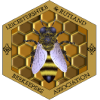Bee Keeping
Keeping bees can be a fascinating and fulfilling pastime and the Leicestershire and Rutland Bee Keeping Association can help with all the theoretical and practical training needed for aspiring bee keepers. There are very many reasons why people get involved in bee keeping, and the rewards are equally varied.
Bee keeping is a subtle mix of practical skills, experience, science and dark arts; it is enjoyed by men and women, young and old, from all walks of life.
Despite all this, it is not for everyone. Before rushing into acquiring bees of your own, you would be advised to consider carefully if bee keeping is really for you. Many of your questions may be answered in our FAQ:
Will I get lots of honey?
The amount of honey a hive produces depends on many things such as the weather and local geography. In a good year, a bee keeper may expect two harvests; one in late spring and a second in mid-summer but an annual honey crop is not guaranteed.
Can I make money selling honey?
Do I need lots of equipment?
Can I make my own hives and equipment?
Do I need a licence to keep bees in Britain?
Do I need insurance to keep bees?
There is no legal requirement to take out any insurance related to beekeeping. However LRBKA subscription includes public and product liability insurance for full members in the event of legal action resulting from activity of their bees or hive products. In the entire history of the Association though no-one has ever made a claim and good tuition and practice will help us keep it that way!
Can I keep my bees in my garden?
How much time do I need to keep bees?
Is beekeeping hard work?
Will I get stung?
It is more or less inevitable that at some point a bee keeper will get stung. Most people are not allergic to stings. If you have any concerns about a possible bee sting allergy then please consult your GP.
Can I learn beekeeping from books and the Internet?
Can my children learn to keep bees?
What help is available once I have completed a beginner’s course?
Are there any other benefits to keeping bees apart from honey?
The purpose of these FAQs is not to discourage anyone from considering bee keeping, but to draw attention to the aspects of the hobby that an aspiring keeper may not have considered. Our advice would be to join a course if one is available, read up-to date books on bee keeping, spend time looking at bee keeping websites, talk to bee keepers and get as much exposure to bees and their management as you can, BEFORE getting bees of your own.
If you would like to become a bee keeper then please Join Us!
If you decide beekeeping is not for you, you haven’t lost anything, you would be more knowledgeable about the topic and, we hope, an enthusiastic advocate for bees.
